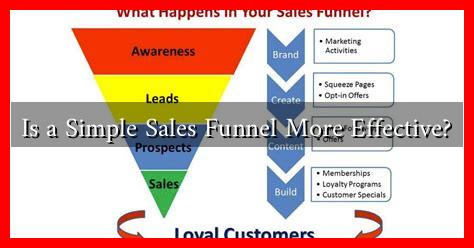-
Table of Contents
Is a Simple Sales Funnel More Effective?
In the world of marketing, the sales funnel is a crucial concept that outlines the journey a potential customer takes from awareness to purchase. While many businesses opt for complex sales funnels with multiple stages and touchpoints, there is a growing debate about the effectiveness of simpler sales funnels. This article explores whether a straightforward approach can yield better results, supported by research, examples, and case studies.
The Anatomy of a Sales Funnel
Before diving into the effectiveness of simple sales funnels, it’s essential to understand what a sales funnel is. Typically, a sales funnel consists of several stages:
- Awareness: The potential customer becomes aware of a product or service.
- Interest: The customer shows interest and seeks more information.
- Decision: The customer evaluates options and considers making a purchase.
- Action: The customer makes the purchase.
While this model is effective, many businesses complicate it by adding numerous sub-stages, touchpoints, and marketing channels. The question arises: does this complexity enhance or hinder the sales process?
The Case for Simplicity
Advocates for simple sales funnels argue that clarity and ease of navigation can significantly improve conversion rates. Here are some reasons why a straightforward approach may be more effective:
- Reduced Friction: A simple funnel minimizes the number of steps a customer must take, reducing the chances of drop-off. According to a study by HubSpot, 70% of customers abandon their purchases due to a complicated checkout process.
- Clear Messaging: Simplicity allows for clearer messaging. When customers are not overwhelmed with information, they can make quicker decisions. A study by Nielsen Norman Group found that users prefer simple designs that are easy to understand.
- Faster Decision-Making: A straightforward funnel can accelerate the decision-making process. Research from the Journal of Consumer Research indicates that consumers are more likely to make a purchase when they feel confident and informed, which is easier to achieve with a simple funnel.
Real-World Examples
Several companies have successfully implemented simple sales funnels, demonstrating their effectiveness:
- Dropbox: Dropbox’s referral program is a prime example of a simple sales funnel. Users are encouraged to sign up and share the service with friends, leading to increased storage space. This straightforward approach has contributed to Dropbox’s rapid growth, with over 500 million users as of 2021.
- Airbnb: Airbnb’s booking process is designed to be user-friendly. With minimal steps from searching for a property to booking, users can complete their transactions quickly. This simplicity has helped Airbnb become a leader in the travel industry.
Statistics Supporting Simplicity
Data supports the notion that simpler sales funnels can lead to higher conversion rates:
- A study by Unbounce found that landing pages with fewer fields (like name and email) had a 120% higher conversion rate than those with more fields.
- According to a report by Marketing Sherpa, 61% of consumers prefer to buy from a company that offers a simple purchasing process.
Challenges of a Simple Sales Funnel
While there are many advantages to a simple sales funnel, it’s essential to acknowledge potential challenges:
- Limited Data Collection: A simpler funnel may not capture as much data on customer behavior, which can hinder future marketing efforts.
- Less Personalization: A straightforward approach may lack the personalized touch that some customers expect, especially in competitive markets.
Conclusion
In conclusion, while complex sales funnels have their place, a simple sales funnel can often be more effective in driving conversions. By reducing friction, providing clear messaging, and facilitating faster decision-making, businesses can enhance the customer experience and boost sales. Companies like Dropbox and Airbnb exemplify how simplicity can lead to significant growth and customer satisfaction. As the marketing landscape continues to evolve, businesses should consider the benefits of simplifying their sales funnels to meet the needs of today’s consumers.
For further reading on sales funnels and marketing strategies, check out HubSpot’s guide on sales funnels.


